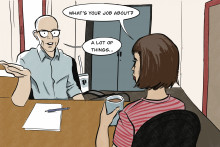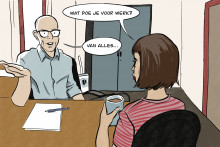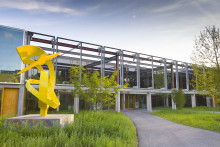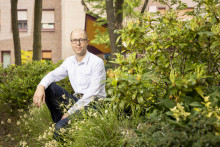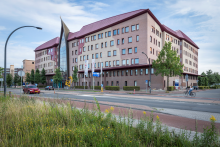When he chose to study Tropical Land Use in Wageningen in the 1990s, Thomas Groen was mainly thinking about seeing the world. ‘I was also very idealistic. It was about how we can improve land use in the world, about making sustainable choices. I never had the preconceived plan to go into science. But yes, you are caught in a trap of things you like and then you somehow end up here.'
'Daddy looks at how green the grass is.' That is how his children explain what he does. The associate professor of Natural Resources himself usually uses a different example when having a drink with someone. ‘I often say that I look at deforestation using satellites. That is easy to explain and everyone understands its usefulness.' But yes, it is also a bit of a simplistic representation, Groen admits. ‘A forest is a green object on Earth with a certain height and structure. If that is cut down for wood production or something else, a big shock goes through the system. This is very easy to observe, but often the erosion of a system is much more gradual. There are savannas where grazing takes place, there is more or less grass. Sometimes the grass is really greener on one side than the other and that says something about how an ecosystem is doing.'

Groen and his colleagues have the task of figuring out exactly what the images say. To do this, they need to make statistical connections between the image, the recording time, size of the location, knowledge about ecosystems and all kinds of other data. That doesn't happen in the field, but behind a computer. The idea of many laymen that scientists like him are constantly scurrying through nature with cameras and butterflies, or in a white coat in a lab, is a misconception. ‘As an associate professor, I am in any case very busy with administration, answering emails, teaching and supervising students. It is largely an office job. Active research is mainly something for graduates and PhD candidates. If I sometimes go into a lab to work with a spectrometer, that's a real outing for me.'
His expertise is broad: Groen can talk about rhododendrons in the Himalayas, wild boars in Overijssel and guerrillas in Colombian forests, but also about various measuring instruments and statistical methods. This makes it difficult to categorize his scientific expertise, which also has its drawbacks. ‘In science everyone talks about interdisciplinarity, but few people actually do it. That makes it difficult to move forward in your career, because people ask: what is your specialty? It worked out well for me, I really like my job, but I do think it would have been easier for me if I had focused more on one domain.'
For now, he mainly wants to continue doing what he is already doing: contributing to the fight against climate change and delivering new 'improvers'. 'I do this work because I think it's useful and because I enjoy it. If my students take that on, it will spread like an oil slick - although that might be bad example here!’



